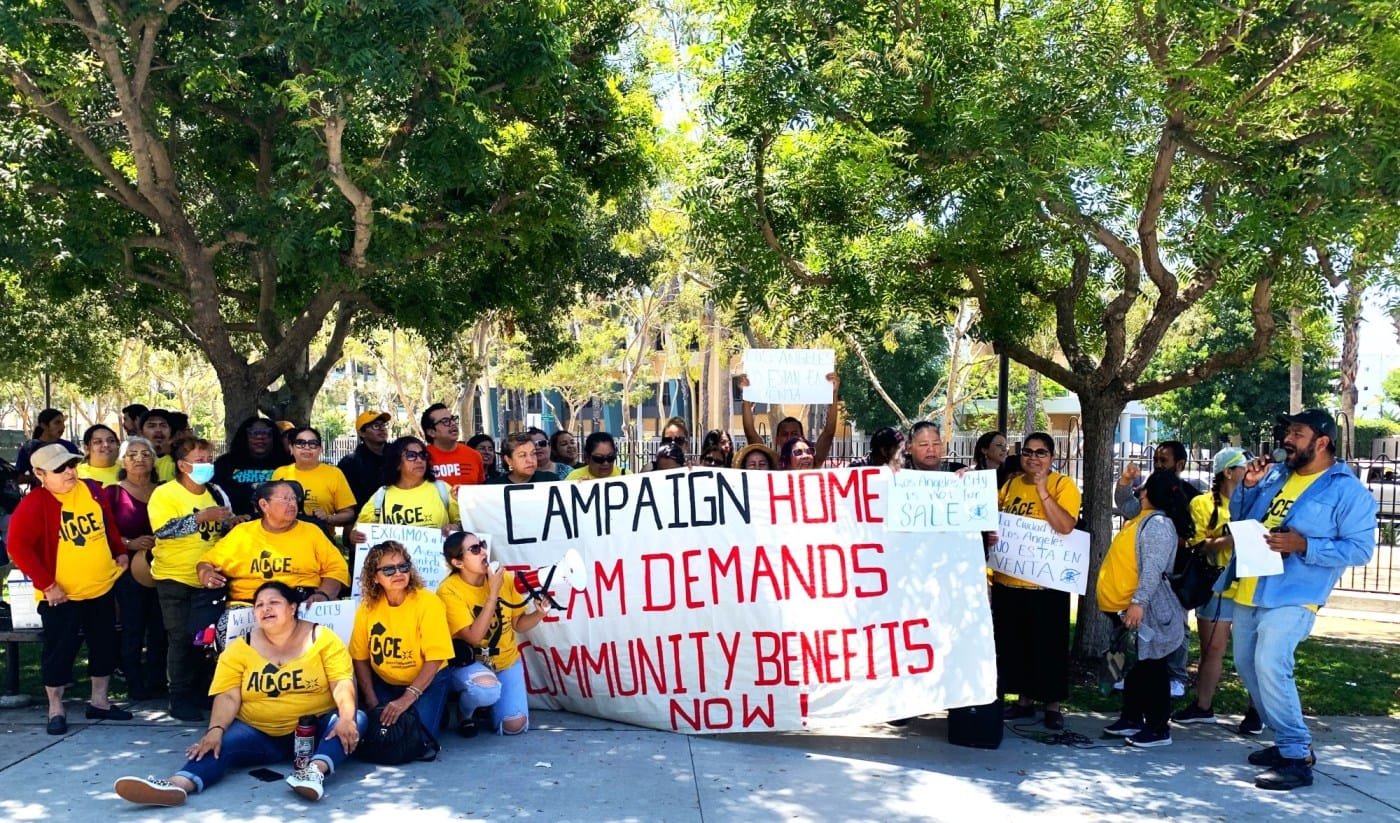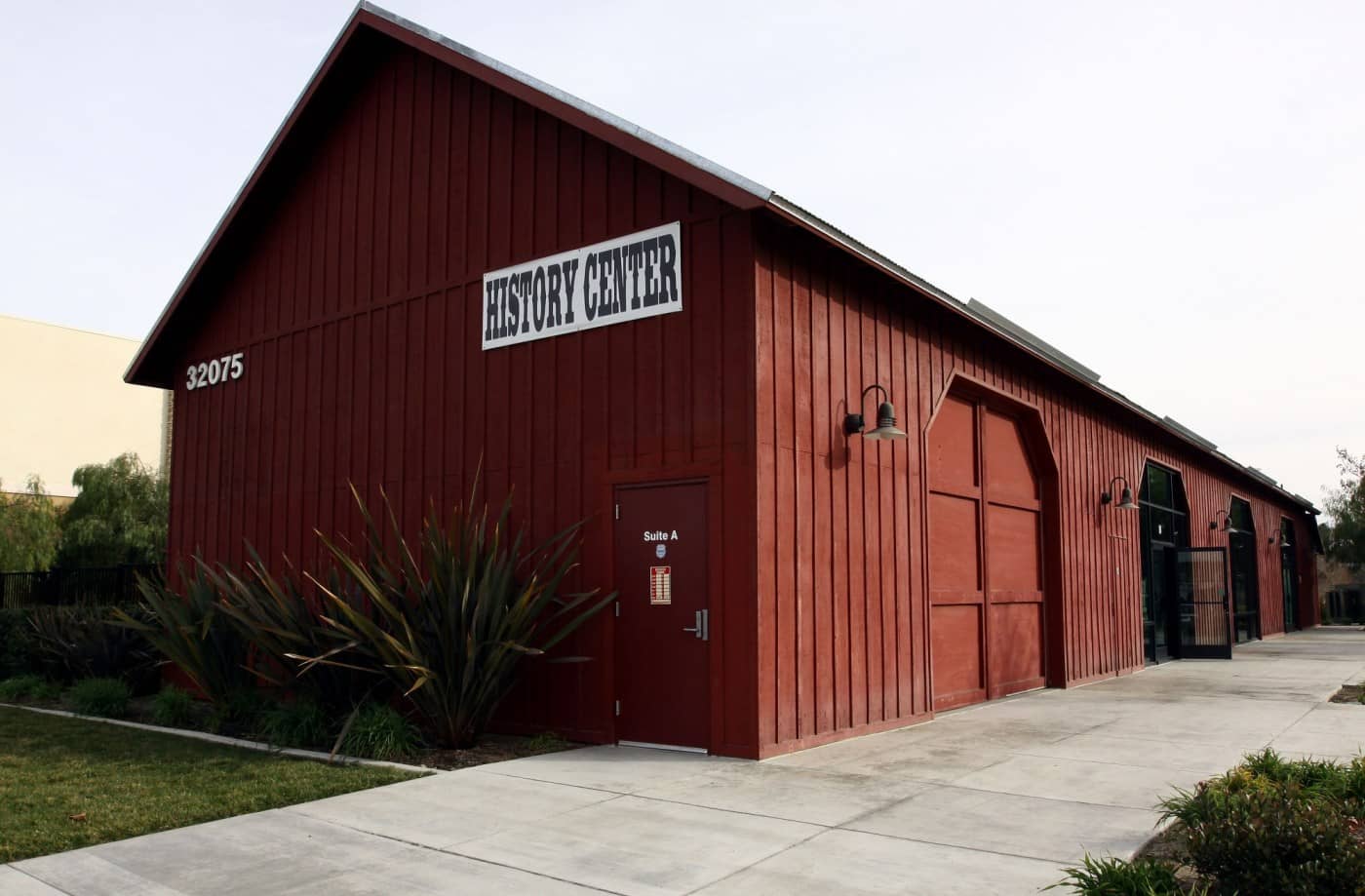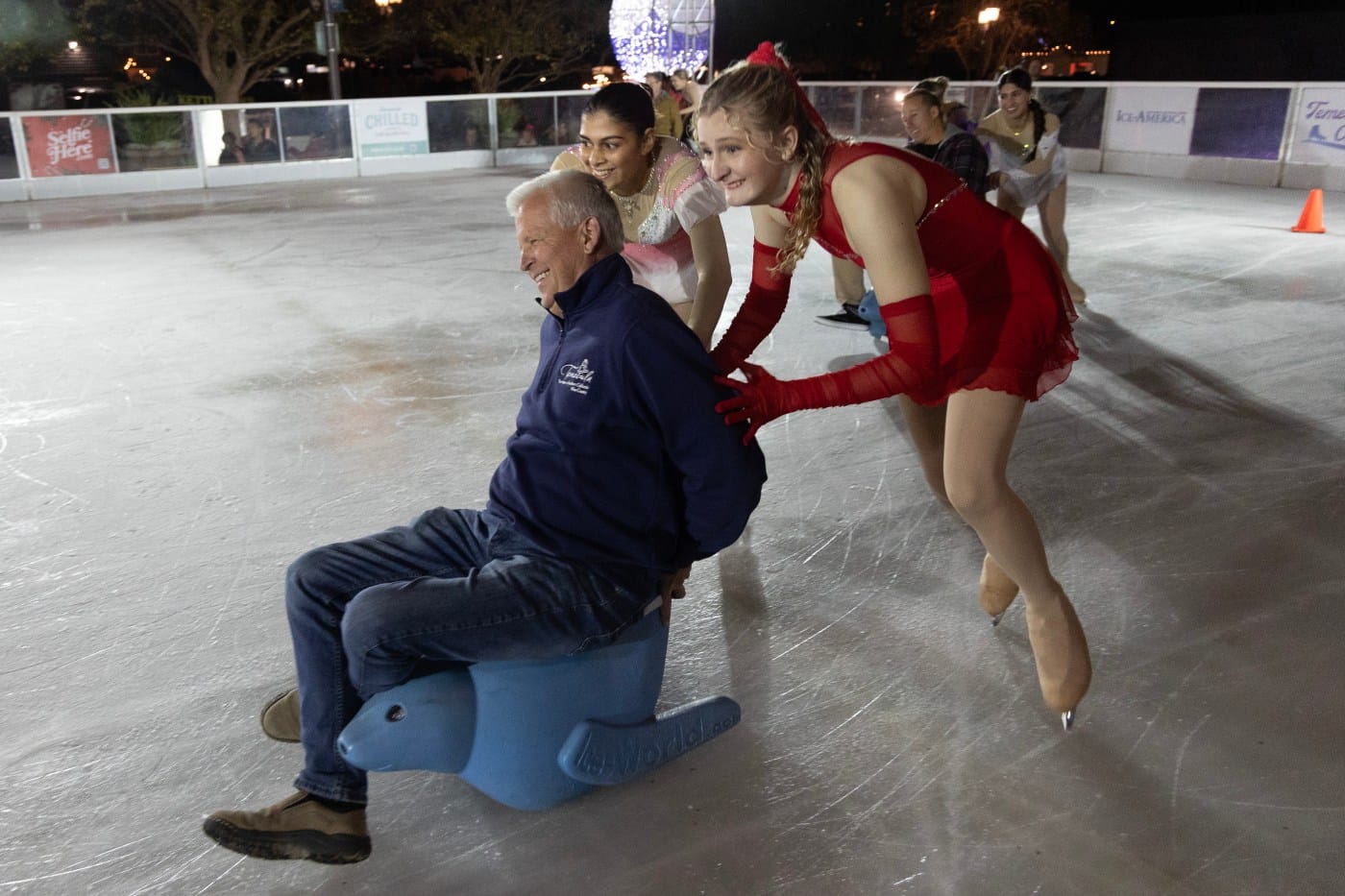Everybody loves the Olympic Games and can’t wait until they arrive in Los Angeles in the summer of 2028.
Right? Wrong. In fact, its detractors — and they are growing — say this two-week party could create huge debts and leave behind a mess that will take a herculean effort to clean up.
At least two grassroots groups see the plan to host the Olympics in Los Angeles as fueling police militarization, housing displacement, gentrification and the strong possibility of financial burdens that will hamstring public budgets and slash social programs for decades.
One of them is NOlympics LA, a group formed in 2017 that points out that every Olympic host city since 1960 has spent more than planned, often leaving them with the bill for cost overruns. They are asking the city of Los Angeles to back out of the games.
“We will try to mitigate whatever harm comes as a result of this bid, such as displacement, destruction and no accountability. We believe there can be a movement to get L.A. out of this,” said Steven Louis, an organizer with NOlympics LA and a resident of West L.A.
With TV screens last week broadcasting the Paris 2024 Olympic Games opening ceremonies, athletes on boats cruising down the River Seine, laser-light shows shooting out of the Eiffel Tower and medals for both the U.S. Men’s and Women’s Gymnastic Teams, what is so bad about that kind of excitement coming to L.A.?
The broadcasts of carefully packaged events make for good entertainment, these groups say. But they are gravely concerned about what goes unreported behind the scenes and in the streets when the cameras aren’t rolling.
NOlympics LA and the newly-formed Alliance of Californians for Community Empowerment (ACCE), Los Angeles chapter, cite some of the negative effects predicted for the 2028 games including homeless sweeps, traffic jams, and short-stay rentals taking over residential homes in low-income neighborhoods of Central L.A., South L.A., Exposition Park and the Westlake District.
“The city of Los Angeles is poised to throw a big global party, and we want to make sure that it includes and uplifts the community,” said Estuardo Mazariegos, ACCE L.A. co-director who represents about 12,000 residents and lives in South L.A. “We face displacement as a result of the Olympics. We don’t want our community to be uprooted.”
Because the neighborhoods around Exposition Park will have numerous Olympic venues, they will be most impacted, ACCE said. That includes staging a diving competition in a local swimming pool near the L.A. Memorial Coliseum used by residents who say the LA28 organizing committee is taking their pool without asking them.
FILE – An LA 2028 sign is seen in front of the Olympic cauldron at the Los Angeles Memorial Coliseum, Wednesday, Sept. 13, 2017. (AP Photo/Richard Vogel, File)
LA.’s games are estimated to cost about $6.9 billion and ACCE L.A. and NOLympics L.A. say that kind of money could be better put toward rental assistance for low-income tenants, building more affordable housing and providing additional park space.
ACCE is floating a proposal for LA28 to put a $1 surcharge on each ticket sold for events at nearby venues. “So that one dollar comes back to the neighborhood for affordable housing and more green spaces,” said Mazariegos at ACCE L.A.
Who will pick up the tab?
Another issue raised by many, including experts who’ve studied past Olympic games, are cost overruns experienced by previous Olympic city hosts. This is a major concern, they said.
If revenues from corporate sponsors, TV broadcasting and merchandise sales don’t measure up, the city of Los Angeles would be on the hook to make up the difference. That gamble could be why L.A. and Paris had zero competition for the 2024 and 2028 games — few cities want to take the risk.
“Hosting the Olympics sets you up to hand the IOC (International Olympic Committee) an open pocketbook, and it is difficult to not end up in debt,” wrote Daniel Durbin, professor of the USC Annenberg Institute of Sports, Media and Society in an emailed response on July 29. “It’s a high-risk, limited reward act.”
With the games exceeding their budgets by about 172% since 1960, if that happened in L.A. in 2028 the budget could balloon to $18.8 billion, according to a report from Olympics Watch, a transnational archive of content that challenges traditional Olympic storylines.
For example, the 2004 Olympics in Athens left the city with deteriorating venues and debts after spending 8.5 billion Euros. That debt factored into Greece’s financial woes years later.
Speaking on background, an LA28 spokesperson said it has already secured $1 billion in gross sponsorships and it is continuing to work on raising money to cover the costs.
Will Olympics boost tourism?
Durbin said L.A. hopes it can absorb any losses by saying the boost in prestige was worth it.
But does Los Angeles, a tourist mecca, need more caché or tourists? Durbin says it is not Salt Lake City, Athens, or Sochi, Russia, smaller, less-known cities that elevated their public status as a result of hosting the games.
“This is more valuable for them, and for an Atlanta, even a Beijing, than it is for L.A., which is already a global tourism power, has had the Olympics twice already and is loaded to the teeth with Kardashians,” Durbin wrote.
But surely tourism will grow as thousands of athletes come to Los Angeles to compete, along with their family members and friends, and spectators with tickets who will pour in. Right? Not necessarily, research shows.
In the 2012 London games, tourism levels actually dropped by 6% compared to the year prior, reported The Telegraph, a British newspaper. The newspaper predicted that Paris, with many empty hotel rooms, could see a drop in tourism.
Durbin said cities with Olympics venues — Los Angeles, Long Beach, Carson, Pasadena and Temecula — should measure the increase in tourism from previous summers, not just report the whole number. “But you really have to look at how many tourists were there above your average for those weeks, if you want to see the real impact,” he wrote.
Louis of NOlympics LA called the increase of tourism during the two weeks of the Olympics a myth. “Who wants to go to the summit of the world’s largest security event?” Louis asked.
Not just an ‘LA Olympics’
Other cities have rolled out the welcome mat for the 2028 Olympics.
The city of Carson has signed deals for four Olympic sports hosted by Dignity Health Sports Park, home of the Los Angeles Galaxy: cycling track at the Velodrome, hockey at The Fields (now training grounds for L.A.Galaxy), rugby at the stadium, and tennis at the Tennis Center.
Long Beach will host canoe sprint, rowing, sailing, marathon swimming and triathlon events, water polo and handball. Officials predict it will bring tourism dollars and more recognition to the city.
Pasadena’s Rose Bowl will host the semi-finals and finals of both men’s and women’s soccer, said Casey Wasserman, chairman of LA28, the group organizing the games, on a talk show on KPCC/LAist public radio in June. Pasadena is close to finalizing a host agreement with LA28, said Jens Weiden, Rose Bowl Operating Company general manager and CEO.
“We are excited to host soccer for the third time” in Olympic history, Weiden said. “In one of the most historic stadiums in the world.”
Pasadena City Councilmember Steve Madison said compensation from LA28 may come as in-kind improvements to the stadium but details are still being worked out. Wasserman said on KPCC/LAist that the organizing committee pays rent for each venue, just like a rock band would for a concert. Wasserman said no capital improvements are required of venue owners.
Benefits vs. societal costs
Many point to the LA 1984 Summer games as a model of efficiency, since it used mostly existing arenas for venues, a template still being used today. For example, the Olympic villages where athletes stay will not be new buildings but instead dormitories at UCLA will be used, according to LA28.
The 1984 games also ended with a profit of $250 million. The LA84 Foundation distributed the bulk of that surplus to support youth sports and recently celebrated its 40th anniversary. Today, LA28 and city of L.A. through the PlayLA program are providing youth sports as well as adaptive sporting sites and equipment and more than 176,000 participants enrolled in PlayLA activities during the 2022-2023 year, according to LA28.
FILE – In this July 28, 1984 file photo, balloons are released into the air from the field of the Los Angeles Memorial Coliseum as part of the opening ceremony for the Summer Olympic Games in Los Angeles. The Summer Games return to Los Angeles in 2028. (AP Photo/Dave Tenenbaum, FIle)
But ACCE LA says the lead up to the 1984 games gave impetus to LAPD, led by Chief Darryl Gates, to sweep out homeless from encampments and harass people of color. ACCE LA and NOlympics LA said those actions stoked the fires of the 1992 uprisings after four white Los Angeles police officers were acquitted of the severe beating of Rodney King, an African-American motorist.
Both groups point to claims that Paris police moved out 13,000 homeless from the streets near the Seine River and other venues to portray a clean, untarnished city for a world audience.
ACCE described money being distributed for youth sports in Los Angeles since 1984 as a trickle. And they called the support from First District Supervisor Hilda Solis — to hold watch parties at county parks in areas where people can’t afford to attend the games — unhelpful.
“We need something beyond viewing parties. We want long-term benefits for our community,” said Mazariegos.
Burbank City Councilman Konstantine Anthony had asked the Board of Supervisors to file an injunction against the city of L.A. to block the games, saying smaller cities have not been included in the negotiations. He said Burbank must expand its airport to handle more travelers in 2028, but it has not received any help from LA28 or the IOC.
He said Second District Supervisor Holly Mitchell has acted to help L.A. communities whose infrastructure, housing and parks will be impacted.
In a statement regarding issues raised by ACCE LA’s, Mitchell wrote: “I share my constituents’ concern about ensuring the Olympics provide an economic benefit for their neighborhoods that will be heavily impacted by the influx of visitors.
“My team will continue working with our county departments and partners across the district to ensure we proactively support communities that will be spotlighted on the global stage,” Michell wrote in an emailed response.
She led a motion in May, approved by the board, for an analysis of anticipated costs to unincorporated communities. The county will look at ways to generate revenue for impacted areas.
“As a region, we must work to safeguard against the impacts of gentrification and displacement, and any legacy impacts realized by the games should be targeted to Equity Focused Communities,” read the motion. It also cited the need for transportation projects.
Transportation: A make or break amenity
“If you are not prepared for it, the influx of people can make for a disaster, overwhelming transportation systems, housing and so on,” Durbin wrote.
Mitchell said LA28’s $6.9 billion budget does not include transportation needed to move spectators to and from the Olympic games.
LA Metro is relying on state and federal dollars. In April, U.S. Sen. Alex Padilla and LA Metro CEO Stephanie Wiggins celebrated $900 million in federal funding for infrastructure and transit to help during the 2028 Olympics.
But $709.9 million of that will go to two projects already under construction: the East San Fernando Valley Light Rail Transit Project and sections two and three of the D (Purple) Line Subway Extension Project between Koreatown and the Veterans Affairs Medical Center in Westwood. The San Fernando Valley line won’t be finished in time for the 2028 games, but the D Line extension is set to be operating by summer 2028 or earlier.
On July 26, Padilla announced a $200 million federal grant to help a bus leasing program for the 2028 Olympic and Paralympic Games. Buses from outside agencies will be leased and added to Metro’s bus fleet.
“This city is in desperate need of investments in infrastructure and transit. Those projects being worked on are for attendees of the Olympics,” Louis said. Specifically, the added buses for the games will take tourists from downtown and LAX-area hotels to the games, he said. “The IOC is dangling carrots that are incidentally for public benefit, but are self-serving,” he said.
ACCE joined up with ACT-LA to ask for permanent transit improvements such as signs to navigate the LA Metro system, faster bus service and bus-only lanes. “We should make sure investments in service extend well past the Olympic Games,” said Laura Raymond, executive director of ACT-LA, speaking at an ACCE LA rally in Jesse Brewer Park in South L.A. on July 26.
“We need to center on community needs. The games should serve Los Angeles, not the other way around,” Raymond added.
City leaders often speak of acquiring a legacy by hosting world famous Olympic Games competitions. The 150,000 low-income residents near the L.A. Coliseum, where track and field events will be held, speak of a different kind of legacy.
“We want a legacy that uplifts our communities with affordable housing, good jobs and more access to green space. The 2028 Olympics is a chance to show the world they can do this equitably,” said Mazariegos.
Related links
$200 million federal grant in the works to use public buses at 2028 Olympics
Metro, elected officials praise $900 million in federal funds for 2028 Olympics in LA
With venues nearly set for 2028 LA Olympics, cities hope for cache, tourist cash
LA County wants to tap culture, arts, recreation opportunities when Olympics return in 2028
LA City Council approves games agreement ahead of 2028 Olympics



